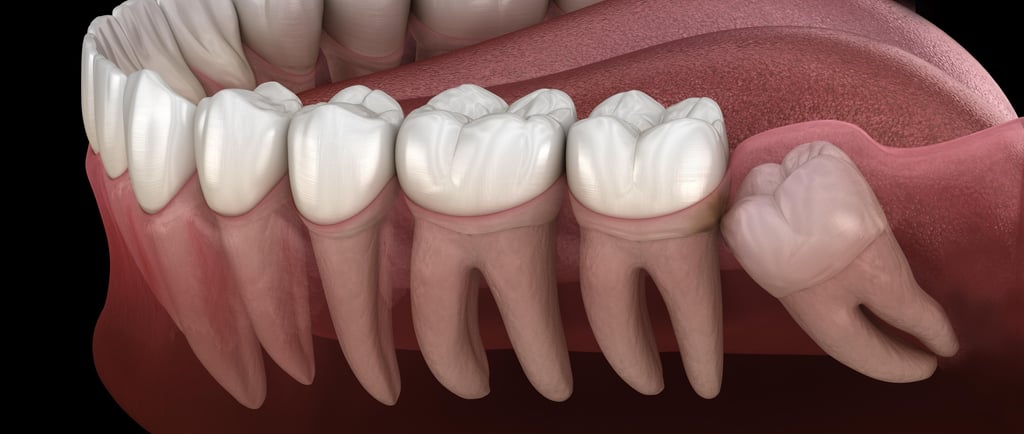SMILE- It costs nothing !!!
Do Wisdom Teeth Need Removal? Expert Insights on wisdom teeth removal
Discover if wisdom teeth need removal by exploring the reasons, potential complications, and expert recommendations. Make an informed decision about your wisdom teeth removal and ensure your smile stays healthy and pain-free.
10/16/2024
Do Wisdom Teeth Need to Be Removed?
Wisdom teeth, or third molars, are the last set of teeth that usually emerge in the late teens or early twenties.
For some people, these teeth grow without causing any issues, while for others, they lead to discomfort or complications.
This often leads to the question: Do wisdom teeth really need to be removed? The answer isn't a simple yes or no—it depends on your unique dental situation.
Why Do We Have Wisdom Teeth?
Wisdom teeth were useful to our ancestors, who had a diet consisting of hard-to-chew foods like raw plants, roots, and tough meats.
Their larger jaws could comfortably accommodate these extra molars, which helped them grind down food.
However, due to evolution, modern humans have smaller jaws, making it harder for wisdom teeth to fit without causing problems.
Related :Wisdom teeth extraction cost in India
When Should Wisdom Teeth Be Removed?
Impacted Wisdom Teeth
Impacted wisdom teeth occur when they don’t have enough space to grow in properly.
This can lead to teeth becoming stuck below the gumline, or growing at ackward angles pressing against nearby teeth.
Impacted wisdom teeth can cause pain, infection, and even damage to surrounding teeth and bone. In these cases, removal is typically recommended.
Infections or Gum Disease
Even if your wisdom teeth have partially erupted, they are often difficult to clean due to their location at the back of the mouth.
This can lead to infections like pericoronitis (infection around the wisdom tooth) or gum disease.
Removing wisdom teeth in this situation can prevent future infections and preserve your oral health.
Tooth Decay
Wisdom teeth are more susceptible to cavities because they are harder to clean properly, and often, there is less room to floss.
Severe tooth decay in wisdom teeth may require extraction, especially if the damage is extensive.
Cyst Formation
In rare cases, wisdom teeth can cause cysts or tumors to form around the tooth. This can damage the jawbone, teeth, and nerves.
In such situations, wisdom tooth extraction is necessary to prevent further complications.
Crowding of Other Teeth
If your wisdom teeth are pushing against your other molars, they can cause overcrowding, which may misalign your teeth over time.
This is especially concerning if you've had braces or orthodontic work to straighten your teeth.
To avoid shifting and crowding, dentists may recommend removing wisdom teeth before they become a problem.
Related :How to reduce swelling after wisdom tooth extraction
When Can Wisdom Teeth Stay?
Not all wisdom teeth need to be removed. Here are situations where it might be safe to leave them alone:
Healthy and Properly Positioned Wisdom Teeth
If your wisdom teeth have come in completely, are not impacted, and are positioned correctly, they can stay in your mouth without causing issues.
They should be easy to clean and not cause discomfort.
No Signs of Infection or Decay
Wisdom teeth that are healthy, without any decay, cysts, or gum disease, and are functioning well like other teeth, don't necessarily require removal.
Regular dental check-ups can ensure these teeth stay healthy.
Adequate Jaw Space
Some people have enough room in their jaws for their wisdom teeth to grow in without crowding other teeth.
If your jaw is large enough and your wisdom teeth aren’t disrupting nearby teeth, they may not need to be extracted.
What Happens If You Don’t Remove Problematic Wisdom Teeth?
Leaving problematic wisdom teeth untreated can lead to long-term issues, including:
Ongoing Pain: Impacted wisdom teeth can press against nerves and bones, leading to persistent discomfort.
Infections: Bacteria can accumulate around partially erupted teeth, leading to chronic infections.
Damage to Other Teeth: Wisdom teeth can press against adjacent molars, causing misalignment, shifting, and even damage to nearby teeth.
Cyst or Tumor Formation: If left untreated, impacted wisdom teeth can develop cysts, which may damage the jawbone and nearby teeth.
The Removal Process
Wisdom teeth removal is a common and routine procedure. If your dentist recommends extraction, they will typically refer you to an oral surgeon for the procedure.
Here’s what to expect:
Before the Procedure: You’ll likely undergo a consultation with the oral surgeon, who will take X-rays of your mouth to plan the extraction.
The surgery is typically done under local anesthesia, sedation, or general anesthesia.
The Procedure: The oral surgeon will make an incision in your gum to access the wisdom tooth, remove it, and then stitch the area if necessary.
The entire procedure can take 45 minutes to an hour, depending on the complexity.
Recovery: After the procedure, you may experience some swelling, discomfort, and mild bleeding. Most people recover within a week, but full healing of the socket may take a few months.
So, do wisdom teeth need to be removed? The answer varies. Wisdom teeth should be removed if they are causing pain, infection, crowding, or other complications.
However, if they are healthy, fully erupted, and not causing any issues, removal might not be necessary. Regular dental check-ups and X-rays can help monitor your wisdom teeth and ensure they don’t pose a threat to your oral health.
Always consult your dentist to discuss the best course of action for your situation.

Contact Smiles
drdeepi15@gmail.com
Dr. Deepika B.D.S
© 2025 SmileWide Dental. All Rights Reserved.
Have doubts ..?


